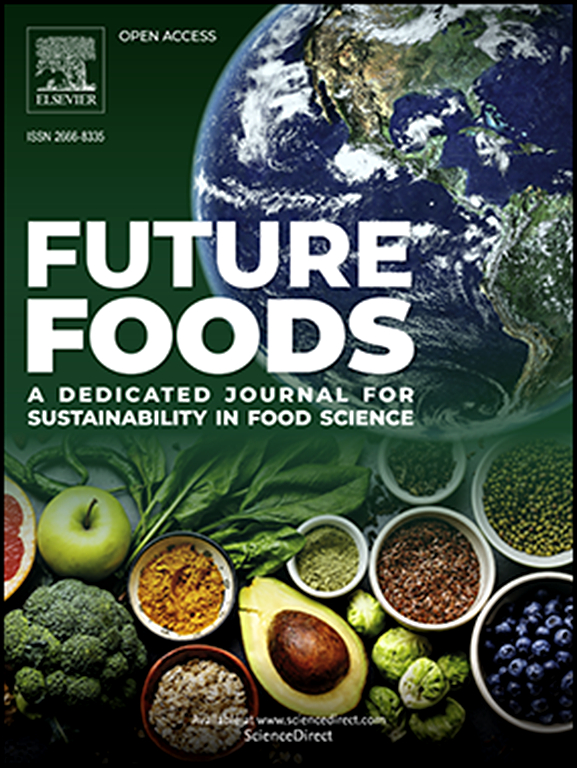How the popularization of dietary guidelines affects healthy eating behavior: Evidence from the choice of staple food structure in China
IF 8.2
Q1 FOOD SCIENCE & TECHNOLOGY
引用次数: 0
Abstract
Long-term high consumption of refined grains is detrimental to human health. This study aims to assess the effects of dietary guidelines on healthy eating and provide policy insights for dietary pattern transition. The staple food structure considered in this paper consists primarily of a combination of refined grains (rice and white flour mainly) and whole grains and potatoes in various proportions. Using a nationally representative sample of 102,464 adult respondents drawn from the Food Safety and Nutrition Health Survey (FNS), we discovered that awareness of the Chinese Dietary Guidelines (2016), issued by the Chinese Nutrition Society, can help residents choose a healthier staple food structure by substituting refined grains with a higher proportion of whole grains and potatoes. Further analysis reveals that (a) knowing the dietary guidelines moderates the staple food choices of obese, urban-dwelling, and male groups, effectively improving these groups’ staple food choices; (b) knowing the dietary guidelines also promotes residents’ dietary diversity and vegetable intake; and (c) addressing potential endogeneity due to reverse causality using an instrumental variable approach, our mechanism analysis shows that dietary guidelines primarily promote healthy dietary choices by enhancing nutrition knowledge. This paper examines the health effects of dietary guidelines on residents’ staple food choices and demonstrates the significance of dietary guideline popularization and nutrition knowledge based on dietary guidelines.
膳食指南的普及如何影响健康饮食行为:来自中国主食结构选择的证据
长期大量食用精制谷物对人体健康有害。本研究旨在评估膳食指南对健康饮食的影响,为饮食模式转变提供政策见解。本文考虑的主食结构主要由精制谷物(主要是大米和白面粉)和不同比例的全谷物和土豆组成。通过对食品安全与营养健康调查(FNS)中102464名具有全国代表性的成年受访者的调查,我们发现,了解中国营养学会发布的《中国膳食指南(2016)》,可以帮助居民选择更健康的主食结构,以更高比例的粗粮和土豆代替精制谷物。进一步分析发现(a)了解膳食指南可以调节肥胖人群、城市居民群体和男性群体的主食选择,有效改善这些群体的主食选择;(二)知悉膳食指引亦有助促进居民的膳食多样性及蔬菜摄入量;(c)利用工具变量方法解决反向因果关系的潜在内生性问题,我们的机制分析表明,膳食指南主要通过提高营养知识来促进健康的饮食选择。本文考察了膳食指南对居民主食选择的健康影响,论证了膳食指南的普及和基于膳食指南的营养知识的意义。
本文章由计算机程序翻译,如有差异,请以英文原文为准。
求助全文
约1分钟内获得全文
求助全文
来源期刊

Future Foods
Agricultural and Biological Sciences-Food Science
CiteScore
8.60
自引率
0.00%
发文量
97
审稿时长
15 weeks
期刊介绍:
Future Foods is a specialized journal that is dedicated to tackling the challenges posed by climate change and the need for sustainability in the realm of food production. The journal recognizes the imperative to transform current food manufacturing and consumption practices to meet the dietary needs of a burgeoning global population while simultaneously curbing environmental degradation.
The mission of Future Foods is to disseminate research that aligns with the goal of fostering the development of innovative technologies and alternative food sources to establish more sustainable food systems. The journal is committed to publishing high-quality, peer-reviewed articles that contribute to the advancement of sustainable food practices.
Abstracting and indexing:
Scopus
Directory of Open Access Journals (DOAJ)
Emerging Sources Citation Index (ESCI)
SCImago Journal Rank (SJR)
SNIP
 求助内容:
求助内容: 应助结果提醒方式:
应助结果提醒方式:


